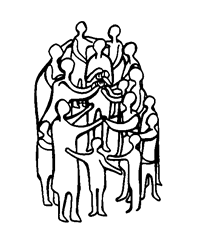What Might a Christian Life Look Like?

Spirit of Simplicity: 2-A884
Wouldn't it be great to learn in worship What a Christian Life Might Look Like? So much of the time in worship we hear generalities. Yes, adult education may be more specific, but fewer than ten percent of worship attendees go to Adult Forum.
Generalities leave people to their own devices. Each person has to 'reinvent the wheel,' do all their own research, try to figure out whom to trust.
Pastors have a good reason to avoid specifics in worship. There's a chance someone will be offended. And people who are offended tend to give less.
So, pastors urge the faithful to 'do what you can.' This can easily get translated as 'do what's convenient.' It's OK to stay in your comfort zone.
What a bore! Yes, it's safe. But it's hardly the dynamic model that Jesus showed us.
Yes, it is critical to avoid 'shoulding.' Shoulding is about law -- Thou shalt not! The Gospel is liberating. A simplified lifestyle, for example, is liberating. It is such a joy to get the burden of stuff off our shoulders. Stuff steals our time, money and energy -- buying it, maintaining it and disposing of it properly.
What Might a Christian Life Look Like? is a way to set out positive, helpful suggestions, preferably a few at a time, so that people can picture themselves doing them, without becoming confused or overwhelmed. Specific, concrete suggestions can be offered in numerous ways during worship -- during spoken announcements, in the worship bulletin, as 'blurbs' on a screen before worship, and most importantly as part of the sermon or homily. Best is the integrated approach -- use all these media to convey the same message on the same worship day. So, the people see and hear the suggestions during the same hour. Now let's work on getting smell and touch involved!
A Christian Life Might Look Simpler
Simple living is fun, challenging, healthy and rewarding. It is not about deprivation or sacrifice!
It is fun because it can be a game. We get to learn new ways to simplify from places like SimpleLivingWorks.org. Then we get to 'play' by incorporating those new techniques into our lives, so they become rewarding habits. For example, as we decide what charities to support, it's fun to look up information about them, instead of just reading their promotion literature or web site. Several sites are really helpful. CharityNavigator.org rates charities and gives from zero to four stars. It also lists the salaries of the CEO and other top officials. No matter how big the organization, a CEO might top out at $250,000. Above that, give elsewhere. GuideStar.org and GiveSpot.com are also helpful.
Simple Living is challenging because it can be counter-cultural. We can defy advertising that would try to control our pocket books. We can ask, 'How can I use this system that would control me, my family and friends against it?' For example, I will buy only sale items from traditional commercial retailers so that I can have some funds left over to practice Fair Trade. I'll feel really good supporting Fair Trade co-ops while getting some things I need at lower prices.
Simple Living is healthy because it sees our bodies as the Temple of God and all the Earth as integral parts of God's Creation. Humans are not superior to the Web of Life. We are part of it. There is no American exceptionalism! That vision helps us see, for example, that our eating habits are critical to our own happiness now, and that they are also critical to the survival of our grandchildren.
Simple Living is rewarding because it provides for our financial security now and provides our legacy for future generations. The basic model of at least 10% of income for sharing, at least 15% for saving, and no more than 75% for spending with 0% debt (except mortgage) over a lifetime will allow enough to create a legacy for the future, such as the [your name] Family Fund through non-profits like the Lutheran Community Foundation.
This means living within (or below) our means. That's personal responsibility. It also means dealing with the other half of the equation -- corporate responsibility. Corporations that prey on people's gullibility can be challenged. That can be done directly through personal protest (letter writing) and organized boycotts (http://www.GreenAmericaToday.org/programs/ResponsibleShopper/), or indirectly through government regulation. We may not be able to control what corporations and governments do, but we can be responsible for what we do -- how much we spend and where.
Page updated 6 April 2014
Simple Living Works! * SimpleLivingWorks@Yahoo.com
BLOG: SimpleLivingWorks.WordPress.com
| Blog INDEX
PODCAST |
Podcast INDEX
VIDEOS: YouTube.com/SimpleLivingWorks
MISSION: Equipping people of faith to challenge consumerism, live justly and celebrate responsibly // An all volunteer educational organization.